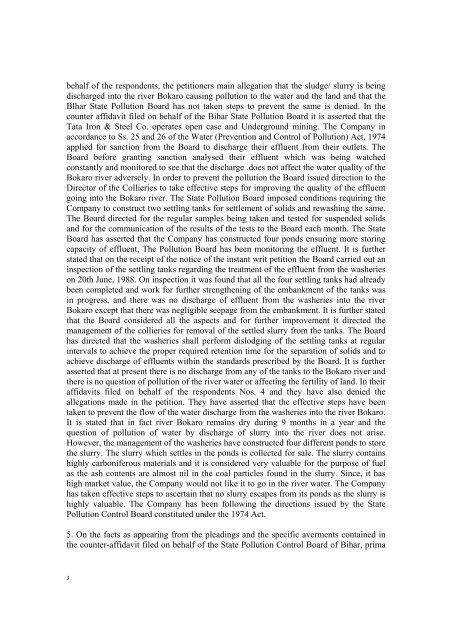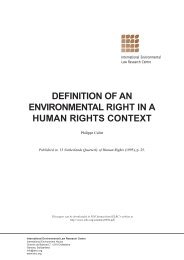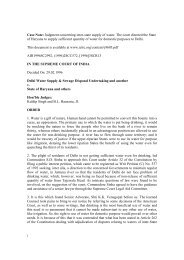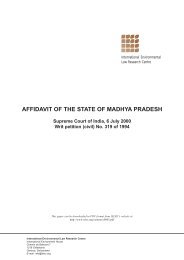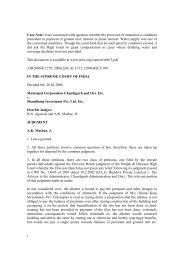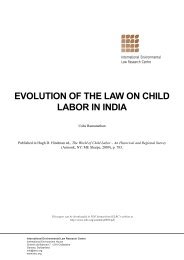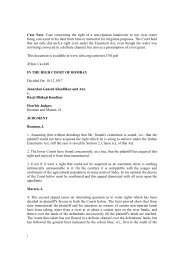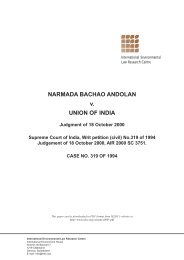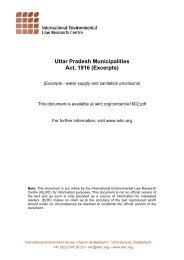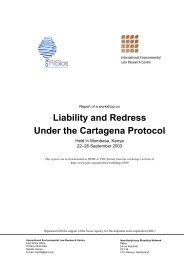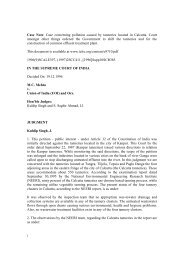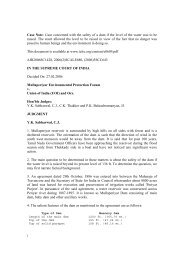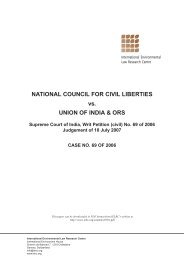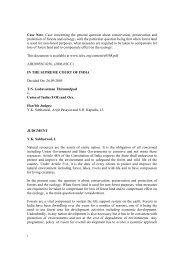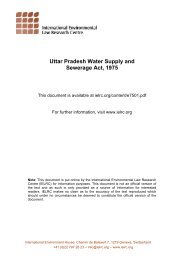Subhash Kumar v. State of Bihar and others, 1991 - International ...
Subhash Kumar v. State of Bihar and others, 1991 - International ...
Subhash Kumar v. State of Bihar and others, 1991 - International ...
You also want an ePaper? Increase the reach of your titles
YUMPU automatically turns print PDFs into web optimized ePapers that Google loves.
ehalf <strong>of</strong> the respondents, the petitioners main allegation that the sludge/ slurry is being<br />
discharged into the river Bokaro causing pollution to the water <strong>and</strong> the l<strong>and</strong> <strong>and</strong> that the<br />
Blhar <strong>State</strong> Pollution Board has not taken steps to prevent the same is denied. In the<br />
counter affidavit filed on behalf <strong>of</strong> the <strong>Bihar</strong> <strong>State</strong> Pollution Board it is asserted that the<br />
Tata Iron & Steel Co. operates open case <strong>and</strong> Underground mining. The Company in<br />
accordance to Ss. 25 <strong>and</strong> 26 <strong>of</strong> the Water (Prevention <strong>and</strong> Control <strong>of</strong> Pollution) Act, 1974<br />
applied for sanction from the Board to discharge their effluent from their outlets. The<br />
Board before granting sanction analysed their effluent which was being watched<br />
constantly <strong>and</strong> monitored to see that the discharge .does not affect the water quality <strong>of</strong> the<br />
Bokaro river adversely. In order to prevent the pollution the Board issued direction to the<br />
Director <strong>of</strong> the Collieries to take effective steps for improving the quality <strong>of</strong> the effluent<br />
going into the Bokaro river. The <strong>State</strong> Pollution Board imposed conditions requiring the<br />
Company to construct two settling tanks for settlement <strong>of</strong> solids <strong>and</strong> rewashing the same.<br />
The Board directed for the regular samples being taken <strong>and</strong> tested for suspended solids<br />
<strong>and</strong> for the communication <strong>of</strong> the results <strong>of</strong> the tests to the Board each month. The <strong>State</strong><br />
Board has asserted that the Company has constructed four ponds ensuring more storing<br />
capacity <strong>of</strong> effluent, The Pollution Board has been monitoring the effluent. It is further<br />
stated that on the receipt <strong>of</strong> the notice <strong>of</strong> the instant writ petition the Board carried out an<br />
inspection <strong>of</strong> the settling tanks regarding the treatment <strong>of</strong> the effluent from the washeries<br />
on 20th June, 1988. On inspection it was found that all the four settling tanks had already<br />
been completed <strong>and</strong> work for further strengthening <strong>of</strong> the embankment <strong>of</strong> the tanks was<br />
in progress, <strong>and</strong> there was no discharge <strong>of</strong> effluent from the washeries into the river<br />
Bokaro except that there was negligible seepage from the embankment. It is further stated<br />
that the Board considered all the aspects <strong>and</strong> for further improvement it directed the<br />
management <strong>of</strong> the collieries for removal <strong>of</strong> the settled slurry from the tanks. The Board<br />
has directed that the washeries shall perform dislodging <strong>of</strong> the settling tanks at regular<br />
intervals to achieve the proper required retention time for the separation <strong>of</strong> solids <strong>and</strong> to<br />
achieve discharge <strong>of</strong> effluents within the st<strong>and</strong>ards prescribed by the Board. It is further<br />
asserted that at present there is no discharge from any <strong>of</strong> the tanks to the Bokaro river <strong>and</strong><br />
there is no question <strong>of</strong> pollution <strong>of</strong> the river water or affecting the fertility <strong>of</strong> l<strong>and</strong>. In their<br />
affidavits filed on behalf <strong>of</strong> the respondents Nos. 4 <strong>and</strong> they have also denied the<br />
allegations made in the petition. They have asserted that the effective steps have been<br />
taken to prevent the flow <strong>of</strong> the water discharge from the washeries into the river Bokaro.<br />
It is stated that in fact river Bokaro remains dry during 9 months in a year <strong>and</strong> the<br />
question <strong>of</strong> pollution <strong>of</strong> water by discharge <strong>of</strong> slurry into the river does not arise.<br />
However, the management <strong>of</strong> the washeries have constructed four different ponds to store<br />
the slurry. The slurry which settles in the ponds is collected for sale. The slurry contains<br />
highly carboniferous materials <strong>and</strong> it is considered very valuable for the purpose <strong>of</strong> fuel<br />
as the ash contents are almost nil in the coal particles found in the slurry. Since, it has<br />
high market value, the Company would not like it to go in the river water. The Company<br />
has taken effective steps to ascertain that no slurry escapes from its ponds as the slurry is<br />
highly valuable. The Company has been following the directions issued by the <strong>State</strong><br />
Pollution Control Board constituted under the 1974 Act.<br />
5. On the facts as appearing from the pleadings <strong>and</strong> the specific averments contained in<br />
the counter-affidavit filed on behalf <strong>of</strong> the <strong>State</strong> Pollution Control Board <strong>of</strong> <strong>Bihar</strong>, prima<br />
3


